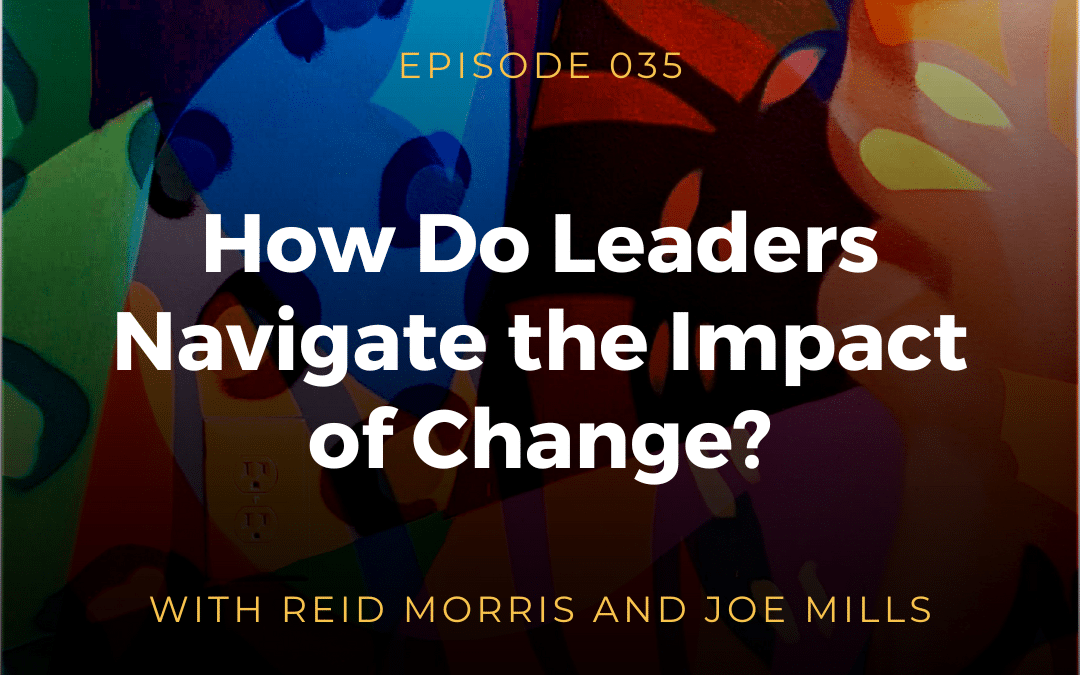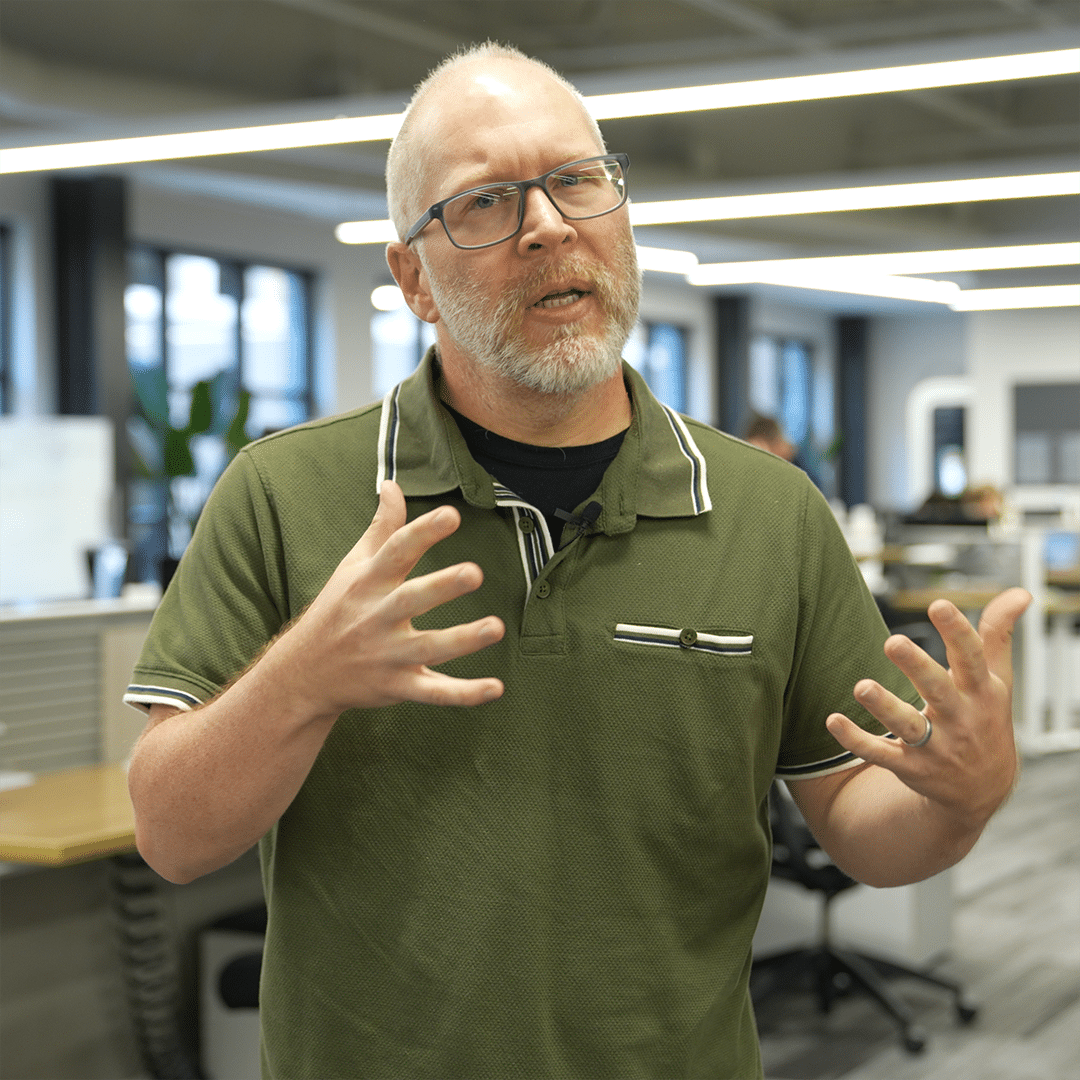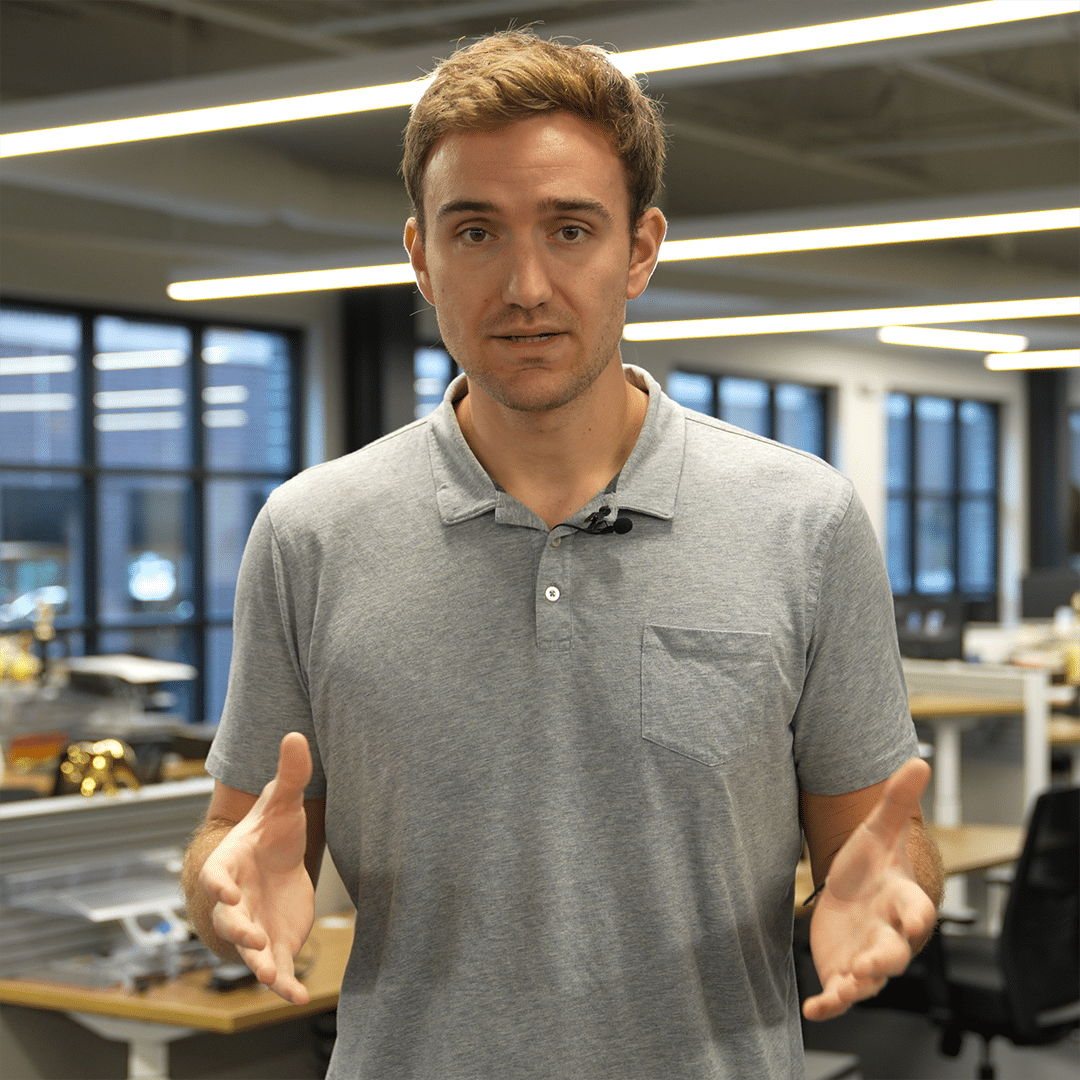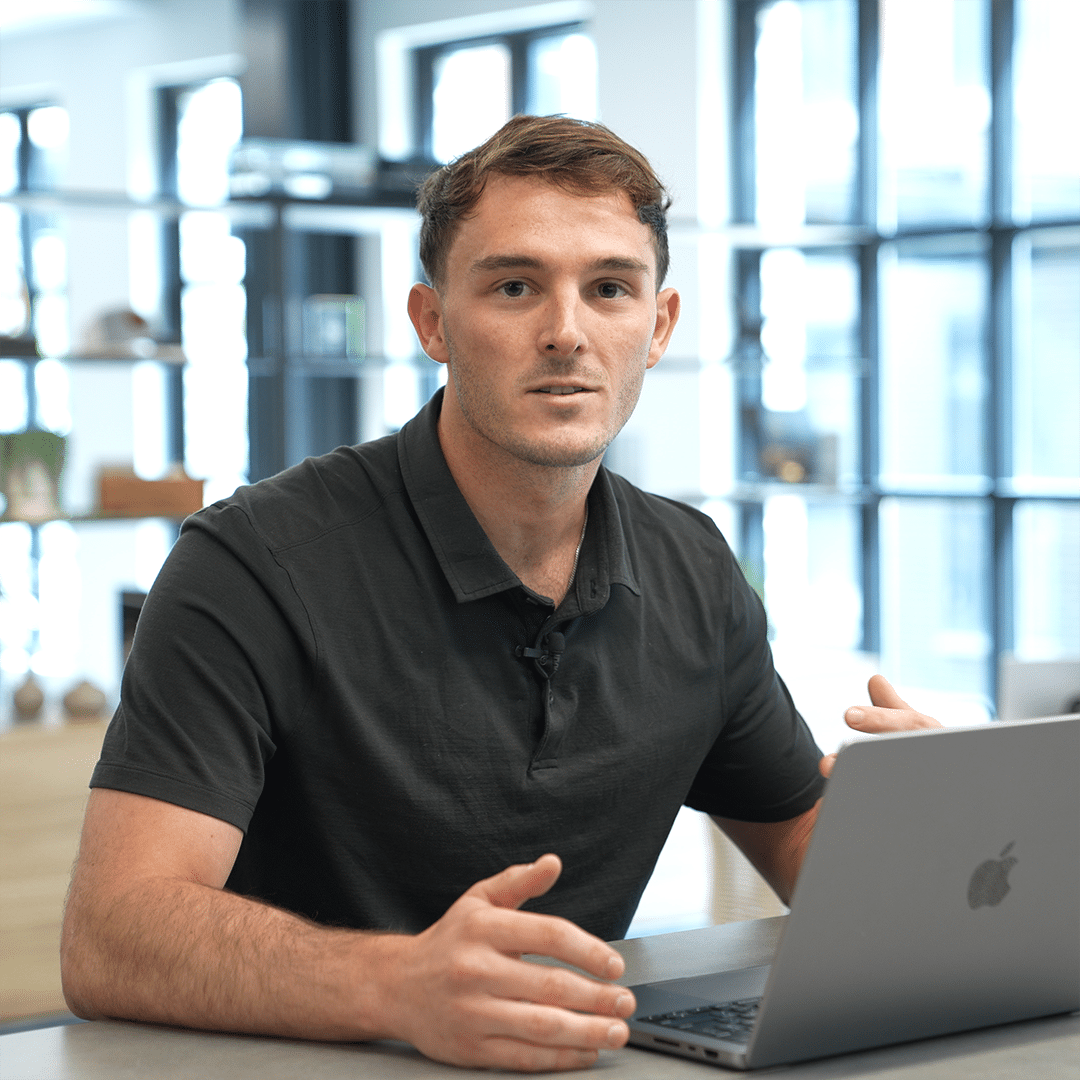How Do Leaders Navigate the Impact of Change?
1,000 Stories
Transcript
Joe: Taking the learning investigations and we’re here to answer this season is how do business leaders navigate these major points of change, these inflection points, in their businesses? And then what are the tools and practices they use to make sure that those big moments are successful?
Reid: I’m Reid Morris.
Joe: And I’m Joe Mills, and we’re embarking on an investigation this season to answer that exact question.
Reid: Then we’re taking our learnings and we’re sharing them with you to help you navigate your own inflection points.
Joe: 1000 Stories, an original show from Element 3. At element three We are on a mission to foster growth in people and business so they can change the world this idea of change It’s central to what we do. We are change agents We love creating it, we love navigating it, and we’re fascinated by the power it has to change our lives and the lives of those around us.
But the thing is, change is also scary. How often have you heard the cliche, no one likes change? And while nearly everyone is fearful of change, we also all understand that growth only happens on the other side of it. It is the inflection point, that moment when you are called to change, when opportunity is just sitting there waiting for you to grab it.
So we’re on a quest to answer the question, how do leaders navigate the impact of change on their personal and professional lives? And to get to that answer, we’ve sat down with business leaders to discuss these defining moments in their lives and to understand what tools they’ve used, what unexpected challenges they’ve encountered along the way.
And how have they navigated these inflection points? And now, we’re sharing our findings with you. Along the way, we’ll be piecing together the common threads throughout the conversations, we’ll be overlaying pieces of complementing and contrasting research, and truly piecing together a cohesive, actionable answer to that question.
If growth is on the other side of change, then this is your map to uncover it. Welcome to Season 3 of 1000 Stories.
Reid: okay Joe, so we are now entering the third season of 1000 Stories, which I know we’re both super excited about. but the fact that we are going into seasonality, even calling this season three, a bit of a change in format from where we were in the past. would you wanna just… give the audience a little bit of context as to, why we’re here, and what are some of the overview changes that we’re making. We’re here because we looked out as we were thinking about our show and where it fits inside of the podcast landscape and also just considering you and I both consume a lot of content. We consume a lot of podcasts. What is the thing missing from some of even our favorite shows that would make it better?
Joe: And so we were looking at our show 1000 stories and saying, Hey, what could we add to this to make it more impactful for the listener? And what we came to is this format of really a true investigation with Tailored Tailored takeaways for you
Reid: Essentially returning to the original concept for the show, but leaning further into exactly and to make that real like one of the things we would love inside of our own shows that we consume Is there’s so much good information in this 45 hour and a half long show But there’s so much that I can’t keep up with it And I can’t remember what takeaways I had from this episode and I can’t remember what Things I tried to implement, all these pieces that there’s just so much information flow that I can’t get the best chunks of it and remember them.
Joe: as we do this investigation, trying to capture those, call them out, and then we’ll be bringing them back together in a investigative report of sorts that details, here’s what we learned, here’s the common threads, here’s where things were contrasting and need more research or information behind them.
and really trying to create A listener experience where you feel like you were inside of the show, and learning with us, and also getting the best takeaways along the way.
Reid: one of the aspects of having this being a season is that we are going to go out and answer one specific question, and I wanna talk to you about that for a moment.
But even besides that, if you think about the show in the past, you could jump into a given conversation and it was a standalone thing. Yep. And we would, have these threads that we would find in different episodes from different points. But what we can do now is craft an actual cohesive narrative from start of season to end of season, that is seeking out to answer one question, which kind of changes the format a little bit.
Joe: Yeah, it also, frankly, makes our podcast team little bit nervous, because in our old model, we could book, changes the guests out into advance, because they were stand alone conversations. What happened with your journey in your life in your story and they lived inside of this silo, but now as we think about it really being intentional with all right. I have a few questions that I want to kick off with and I’m going to have one conversation and there’s going to be gaps that I didn’t get to.
There’s going to be things that they didn’t explain. there’s gonna be questions they couldn’t answer and those gaps and where they lead us will lead to the next conversation. And so it’s going to be a little bit tougher. Frankly, for everyone, because we’re going to be working on this cadence of, Alright, we had a conversation, now we know what we need to go find. Who can answer those questions? Okay, we got them booked. It’s like, that cadence is going to feel very different than, Alright, I’ve got these four shows lined up with four unique individuals, but I don’t have to tie them all
Reid: I I don’t have them inflection points are going to be all business oriented. So this is not going to be things
Joe: Yeah. And these inflection points are gonna be all business oriented. So this is not gonna be things like, I got married, I had a kid, I moved cities. But rather they’re going to be things like I took on capital inside of my business, be it private equity or late state venture. our company merged with a competitor or somebody outside of our field, or we acquired a business. I have a changing leadership, whether that’s me individually moving on to a different role. Maybe I’m moving to the board instead of being CEO, as an example. Or I’ve brought on another leader in my org, or like I’ve transitioned it to the next person.
and the last one being new market entrance. And the commonality across those four different buckets is that these are moments that immediately impact the business strategy for an organization. they define the future five years, ten years, whatever, as being something new, as a new journey. that is really where we’ll be looking at from an inflection point standpoint.
Reid: Yeah. And one of the natural aspects of these being these huge decision points for these leaders is that it’s not just.
A business question. It’s not just a business decision because people that are at these levels of decision making, a highly involved thing. It affects their personal lives, so we want to take some avenues, ask some questions, investigate some things that aren’t just like, what were the business implications of this? Which is something that came up occasionally episodes in the past, but we want to be a lot more intentional about. Those inflection points and how they impact personal and professional.
Joe: Yeah. I think reality is you personal and professional. Walk out of the four walls of your workplace and just forget everything that happened when you’re at a point where you’re making these kinds of decisions.
Maybe it’s your business. Maybe it’s your family’s business Maybe you have been the steward of it for another family Whatever point being you’re in a leadership role where your work is a good chunk of your life the idea that you can just walk out of work and forget about those challenges, forget about those situations is, a fantasy. It doesn’t exist for the people that we work with. Yeah, exactly. And so understanding like you mentioned, okay, this big business change is going to show up in your personal life. We’ve had people off,recording say to us, I wasn’t sleeping during that time. they’ve literally called out one of those inflection points that we talked about along their whole journey. And I’m like, that moment affected me like X, Y, and Z. It made it hard because of this, that, and the other thing.
Reid: And,
Joe: really trying to say to the audience,
Reid:
Joe: look at the personal impact of this. both to showcase, like, this is what they go through, and also to give the tools, because people don’t just live in that. They don’t just go, oh, I’m just not sleeping. Whatever. I gotta solve this, how am I gonna solve this, what’s going on with my life, who am I gonna talk to, is it a therapist, is it a life coach, is it a executive coach, like what do I need to use, what frameworks can I use, is there meditative activities, like all these possible solutions, we want to uncover those and start to fill in the gaps about how they can be used. Yeah, because we’re talking to people who, in theory, either are navigating these inflection points themselves or aspire to. So we want to pull the curtain back and say, well, here’s all the implications of those types of decisions, those types of environments, right?
Reid: and one of the other things that’s a piece of this is the duration that we’re talking about in these people’s experiences. So if you looked at a previous episode of 1000 Stories, we… would talk about, when they founded their business, what happened in this leadership transition and this acquisition, and we’re narrowing the scope of that to just that one inflection point. So we can go in a lot more depth.
Joe: Exactly. That would be the biggest change in how the conversation goes.
Reid: And to make that real,
Joe: you mentioned the work life congruence episode, instead of talking about his transition from small company to leadership of small company, we might
Reid: just talk
Joe: about the leadership of that company. Or we might talk about when they took on their first private equity round. just that moment. Talk to me about what happened there. Talk to me about the process. And you brought something up interesting that hadn’t come to my head before this, but you talked about the implications of those changes. I think there’s a real world where being able to say to people, Hey, you’re chasing this, and when you’re chasing something, it looks so sexy. It’s like, I want it so badly. oh man, I want
Reid: that Porsche.
Joe: I really want that car. oh, were you aware that your insurance triples when you get this? And they’re like,
Reid: wait, what? That your annual service goes from 300 to 3,
Joe: yeah. and so I think it’s also about pulling back the curtain and saying, this thing that you’re chasing has a lot of good sides to it, and it’s awesome, and it will grow you. But hey, you need to be aware of what’s about to come up. These unexpected changes that we referenced, what are the things you didn’t see coming that, smacked you? And you’re like, woof, I got ready for that now. Because I think if you walk in with the expectations set appropriately that I’m chasing this huge goal. I want to take on private equity, and I know when I do this, thing’s gonna come up. Now when it comes up, you’re like, cool. Knew it was coming. I’m good. I can handle it. I got, tools, I have my expectations. Were set. I’m not freaked out by it. It’s not scary to me. It’s not the beast in the closet.
Reid: I’m good. Yeah, and so speaking of those tools, or just the ways that people navigate these inflection points, one of the things that we want to do is, the conversations will not just be with the leaders themselves. So we talked about, did they receive coaching, or did they, have conversation with their spouse? And so we’re actually hoping over the course of the season, it will go where it goes, but to have conversations with some of the other people that were a part of these decisions, a part of these moments, that were not just the leaders
Joe: themselves, right? Yeah, exactly. And it might not be that we talked to one leader who went through, let’s just say it’s an acquisition. And then we talked to their
Reid: spouse.
Joe: It might be that we talked to that leader. And then they talk about being acquired, and then we go to a different capital firm, and we talk to a managing partner about what happens when you’re taking on a company, what happens when you’re deploying capital. Is it stressful for you? Is it not? What are the things that happen outside of due diligence, not that, but like, how are you getting ready to absorb that
Reid: company, and how do you experience the leaders that are a part of the decisions that you’re making too? Exactly. So if you know this managing partner, like the c e o of this company, how did they show up? How did things change? What did you feel from that experience, from your perspective on the decisions that they were making as well?
Joe: that’s a really good point you hear a lot capital companies talk about investing from that they were making as well? if you’re investing in the team, you must be getting very close to the team. You must be understanding who you’re investing in. So I think that would be awesome piece as well.
Reid: Yeah, I think one of the ways to think about that is even when we at Element 3 are talking about marketing with firms companies who come to us with problems, we say words like you can’t see the label from inside the jar, right? And so we’ll be talking to people who have lots of context for these experiences, but there are things that the individual who is experiencing that change just cannot see that the people around them did. So that would just make sure that it’s truly, all inclusive investigation.
Joe: Yep. A hundred percent.
Reid: once this Investigation is done right once we have Answered the questions that we want to have answered on this given topic for this context this inflection point navigation What’s some of what we’re hoping to get out of it, as we’re talking about making this experience a little bit more unique, and what the listener should expect as
Joe: they get to that point? Yeah. A couple things. One thing you should expect during the conversations is that we will be overlapping our own commentary to the conversation. So it might be like, We’re talking to somebody and then you’ll hear read like it will stop and maybe read comes in and says, Hey, if you remember two conversations ago, this same piece was brought up and now we’re tying it back together. This is another input into this same question or this is somebody else using the same tool, we’re reinforcing answer. So that’s one way that you’ll experience. Oh, that’s cool. We’re tying things together. learning as I go along this journey and along this investigation. And then at the end to answer your question directly, we’ll be putting together a report of sorts that really tries to summarize and show as a road map you’re about to go through something big. Here’s the stuff. Here’s what you’re going to experience. Here’s ways you can solve for it. Here’s resources we’d recommend checking out. Here are tools and tactics,like a primary research paper of sorts that would give you some insights how to navigate the moment of
Reid: change.so hopefully all those changes in format, changes in who we’re speaking to, Not only just create really interesting experience making the show a little bit more unique from that standpoint, but really actionable tactical It’s not something that you listen to one time and then those are sort of fleeting memories of what was that one takeaway? I should have had that one time should be lot more useful. Hopefully for the listener moving forward Yeah,
Joe: for What we get is some feedback around was that successful. What would made it even better? Hopefully it’s good in some capacity
Reid: And
Joe: really get to like build that community between us and the people who are listening to the show So that we can try to create the show that is most helpful for
Reid: for them Yeah, for sure. So we’re excited to hear your feedback and we’ll be rolling in a couple weeks.
Sharing Expertise
What good is learning something if you don't pass it on? You can tap into what we know right now – from dealer programs to determining brand architecture – and you don't have to give us a thing.



